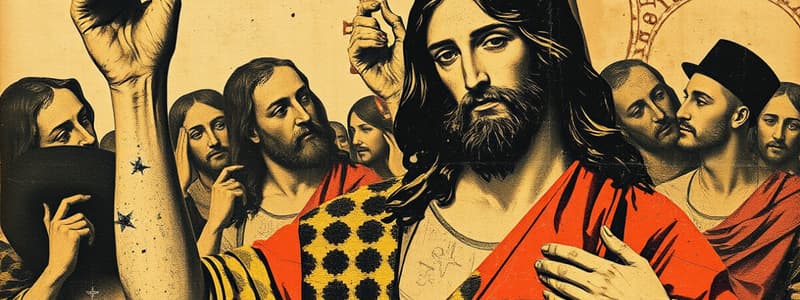Podcast
Questions and Answers
What event is central to the belief of Christianity?
What event is central to the belief of Christianity?
- The birth of Jesus Christ
- The teachings of the apostles
- The resurrection of Jesus Christ (correct)
- The formation of the early Christian community
Which principle is emphasized by the teachings of Jesus that appealed to many and contributed to the growth of Christianity?
Which principle is emphasized by the teachings of Jesus that appealed to many and contributed to the growth of Christianity?
- Wisdom and knowledge
- Love and forgiveness (correct)
- Sacrifice and suffering
- Power and dominance
How did the early Christian community primarily spread the teachings of Jesus?
How did the early Christian community primarily spread the teachings of Jesus?
- Through military conquests
- Through the passionate efforts of disciples and followers (correct)
- By writing detailed theological texts
- Via political alliances and treaties
What characterized the early Christian community's gatherings?
What characterized the early Christian community's gatherings?
What was a significant challenge faced by the early Christian community?
What was a significant challenge faced by the early Christian community?
Which of the following statements best describes the transformation brought about by the crucifixion of Jesus Christ?
Which of the following statements best describes the transformation brought about by the crucifixion of Jesus Christ?
What emotion predominantly characterized the commitment of the early Christians toward their faith?
What emotion predominantly characterized the commitment of the early Christians toward their faith?
What long-term impact did the early Christian community have on society?
What long-term impact did the early Christian community have on society?
What role did the early Christian community play in the 2nd and 3rd centuries?
What role did the early Christian community play in the 2nd and 3rd centuries?
Which figure is NOT mentioned as a key leader in the development of Christian theology during this period?
Which figure is NOT mentioned as a key leader in the development of Christian theology during this period?
What was the reaction of the early Christian community to the persecutions they faced?
What was the reaction of the early Christian community to the persecutions they faced?
Which group of texts was pivotal in shaping the beliefs and practices of early Christians?
Which group of texts was pivotal in shaping the beliefs and practices of early Christians?
How did the Roman authorities respond to Christianity during the 2nd and 3rd centuries?
How did the Roman authorities respond to Christianity during the 2nd and 3rd centuries?
What effect did the persecutions have on the growth of Christianity?
What effect did the persecutions have on the growth of Christianity?
What was a significant outcome of the theological discussions led by figures like Ignatius of Antioch and Justin Martyr?
What was a significant outcome of the theological discussions led by figures like Ignatius of Antioch and Justin Martyr?
What characterized the theological development of Christianity during the 2nd and 3rd centuries?
What characterized the theological development of Christianity during the 2nd and 3rd centuries?
Study Notes
1st Century AD: The Birth of Christianity
- Christianity originated in the 1st century AD, centered on the crucifixion and resurrection of Jesus Christ.
- Jesus Christ, viewed as the Son of God, made the ultimate sacrifice for humanity through his crucifixion.
- His resurrection sparked hope for eternal life, catalyzing the formation of the early Christian community.
- The rapid spread of Jesus' teachings was fueled by the passionate efforts of his disciples and followers.
- The early Christian community emphasized resilience amidst persecution, nurturing a firm Christian identity.
- Core values such as love, forgiveness, and salvation drew in diverse followers.
- Regular gatherings for worship and fellowship enabled the early Christians to maintain unity and build traditions.
2nd-3rd Centuries: Expansion and Theological Development
- Christianity saw remarkable growth throughout the Roman Empire during the 2nd and 3rd centuries, despite severe persecutions.
- Early community members played a crucial role in developing theological foundations, preserving core beliefs.
- Key figures like Ignatius of Antioch and Justin Martyr contributed significantly to early Christian theology.
- Writings by Gospel authors (Matthew, Mark, Luke, John) and epistles of Paul and Peter were foundational for Christian teachings.
- Christian texts provided comfort and guidance, shaping community practices and beliefs.
- Persecution from Roman authorities, including torture and execution, intensified Christian resolve rather than suppressing it.
- The steadfastness of early Christians in adversity affirmed their dedication to Jesus' teachings.
- This period established crucial theological groundwork that influenced the future trajectory of the Catholic Church.
Studying That Suits You
Use AI to generate personalized quizzes and flashcards to suit your learning preferences.
Description
Explore the significant events and teachings that shaped Christianity during the 1st century AD. This quiz delves into the life, crucifixion, and resurrection of Jesus Christ and the rapid spread of his message through his disciples. Test your knowledge about the early Christian community and its foundational beliefs.




